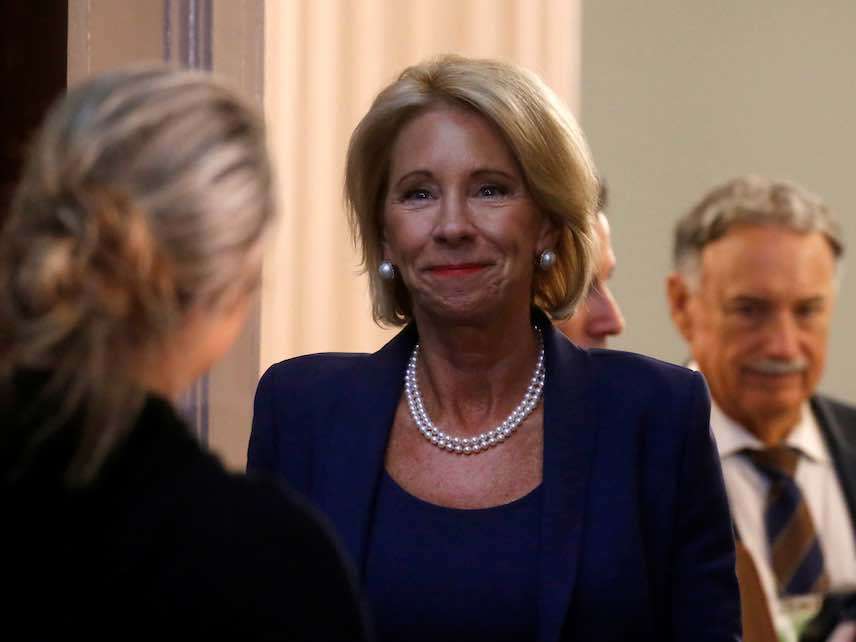Betsy DeVos Plans to Overhaul Title IX, Focus on Due Process for Accusers and the Accused
Reason has more details on the new rules, which would mandate cross-examination in disputes.

The Education Department is drafting a new approach to campus sexual misconduct adjudication. It will permit colleges to adopt higher standards in hearings, mandate cross-examination of relevant parties in a dispute, and stress that all students are considered innocent until proven guilty, an official with knowledge of the proposal has confirmed to Reason.
If adopted as formal policy, these measures would go a long way toward fixing the due process deficiencies that plagued the Obama administration's guidance relating to Title IX, the federal statute that deals with sex discrimination in schools.
This news was first reported by The New York Times, which obtained a leaked draft of the new rules. The Education Department had not planned to release details to the public yet; as such, the agency declined comment to the Times. But Reason was able to confirm that the Education Department is indeed mulling the changes detailed in the Times story.
According to the Times, the new rules "would add the ability for victims and their accused perpetrators to request evidence from each other and to cross-examine each other. The rules also allow the complainant and the accused to have access to any evidence obtained during the investigation, even if there are no plans to use it to prove the conduct occurred."
Cross-examination is a key component of due process and an important tool for arriving at the truth of a dispute. But under the previous administration's Title IX guidance, university officials were discouraged from extending this right to students accused of sexual misconduct, under the theory that scrutinizing alleged victims would be traumatizing.
The new policy would mandate cross-examination in situations where a school's adjudication process involves a live hearing, and it would require an effective substitute in all other cases.
Schools would also be empowered to choose non-adversarial approaches to handling disputes, such as mediation and restorative justice, as long as all parties voluntarily agree that this is in their mutual best interests. Restorative justice has many adherents—public health professor Mary Koss, a feminist and victims' advocate, is one—but was disfavored under the previous administration's rules.
The Education Department also wants to define sexual harassment as "unwelcome conduct on the basis of sex that is so severe, pervasive and objectively offensive that it denies a person access to the school's education program or activity," according to The Times. Previous guidance, released in 2011, compelled administrators to combat any unwelcome conduct of a sexual nature.
These modifications to the federal government's enforcement of Title IX are bound to provoke the ire of those feminists who claim accusers should receive preferential treatment in disputes. But for everyone who values basic fairness in campus sexual misconduct procedures, Secretary Betsy DeVos's plan looks like a massive victory.


Show Comments (57)